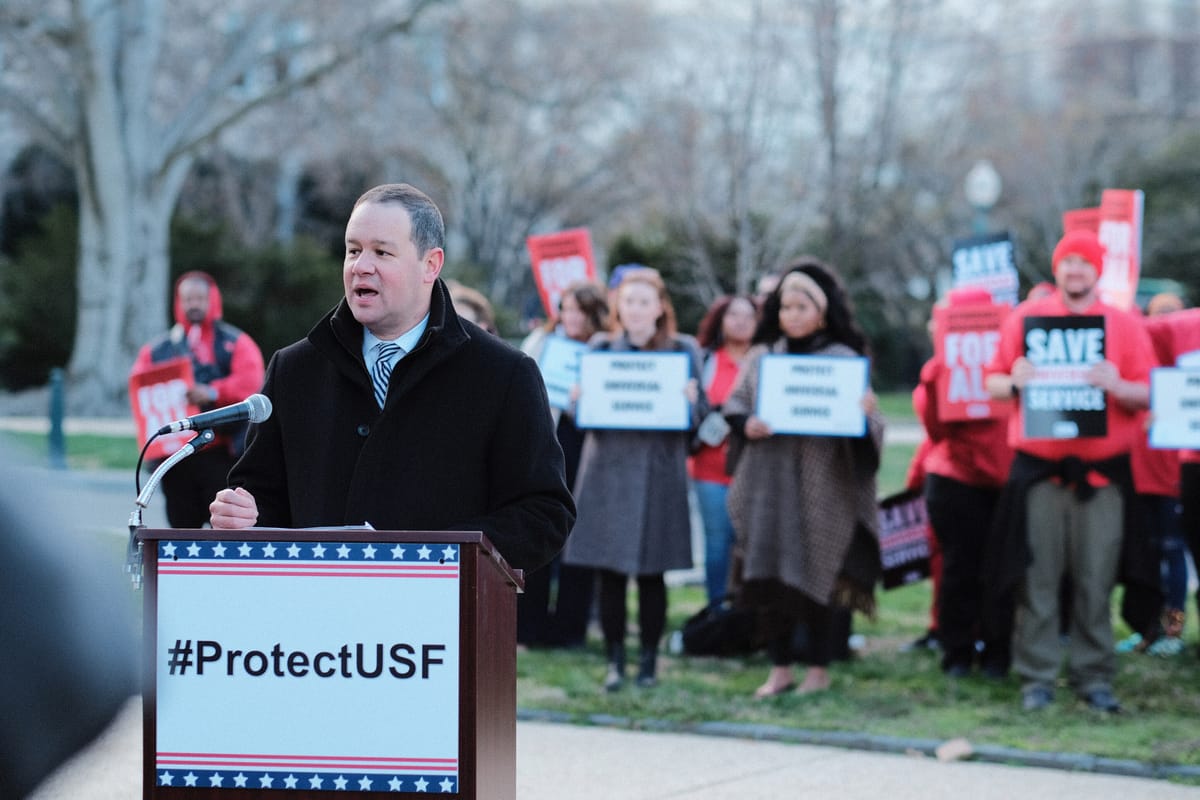USF Proponents ‘Cautiously Optimistic’ After Supreme Court Arguments
Justices are set to decide whether the $9 billion-per-year program is unconstitutional
Jake Neenan

WASHINGTON, March 26, 2025 – Proponents of the Universal Service Fund said they were cautiously optimistic after the Supreme Court heard arguments in a case stemming from a challenge to its constitutionality.
The roughly $9 billion-per-year subsidy funds programs supporting rural broadband networks and communications discounts for low-income households, schools and libraries, and healthcare centers. Managed by the Federal Communications Commission, it’s funded by fees on interstate voice revenue, with accounting work delegated to a private entity the FCC set up for the task.
Consumers’ Research, a conservative nonprofit, had challenged the fund, arguing it ran afoul of the nondelegation doctrine, the idea Congress can’t hand its legislative powers to other entities. The group and others in the conservative legal movement are looking in part for justices to reinvigorate that doctrine, potentially making it more difficult for Congress to hand broad power to agencies.
“We are cautiously optimistic that the majority of justices will uphold the constitutionality of the Universal Service Fund, and that the millions who rely on it – including students, job seekers, veterans, and seniors – will be able to access the internet,” said Joseph Wender, executive director of the Schools, Health, and Libraries Broadband Coalition.
SHLB led the coalition of consumer advocates that, along with the FCC and broadband industry groups, appealed a Fifth Circuit decision that sided with Consumers’ Research.
“Multiple justices questioned what the consequences would be of finding the Universal Service Fund unconstitutional,” he said. “Both the legal consequences as well as the real life consequences of the fund going away.”
Andy Schwartzman, senior counsel for the Benton Institute for Broadband and Society, which was also a party to the case, cautioned that extrapolating too much from oral arguments is always dangerous.
“With that stated caveat, I’d rather be us than them,” he said. “I thought it went very well for our side. But there’s considerable uncertainty.”
He noted the government’s argument that this particular case would be a poor vehicle for revisiting the nondelegation doctrine, which some justices have expressed a desire to do in the past, “seemed to have traction.”
Former FCC Commissioner Mike O’Reilly, said in a statement that those who want to avoid an immediate shutdown “heard much to be encouraged by today,” but that he was still pushing for a short-term legislative fix to preempt any potential disruption from the final ruling.
“There is no reason for anyone to assume any particular outcome before the court rules,” he said.
O’Reilly is an advisor to the Keep America Connected Coalition, a group advocating with legislators for such a move. Broad USF reform has been a longrunning effort, as the base of voice revenue continues to shrink, but the group separately wants legislation addressing the issues in the case. Those are mainly whether the 1996 Telecom Act put enough guardrails on the FCC with respect to raising revenue, and whether the agency is able to delegate administrative tasks to the Universal Service administrative Company.
Joe Kane, director of broadband and spectrum policy at ITIF and a proponent of axing the current funding scheme, emphasized the uncertainty.
“With many justices skeptical of the constitutionality of USF, the Supreme Court could invalidate the structure of the program in the coming months,” he said in a statement.
The group has advocated for funding the program through direct appropriations, rather than tasking the FCC with raising cash. Opponents of that idea say the agency model provides a more predictable source of revenue for rural providers to rely on.
“Congress should enact common sense reforms to focus federal broadband subsidies on the real causes of the digital divide, including digital literacy and affordability, and directly appropriate funds for those efforts. These steps would moot the Supreme Court case and make USF more effective,” Kane said.









Member discussion